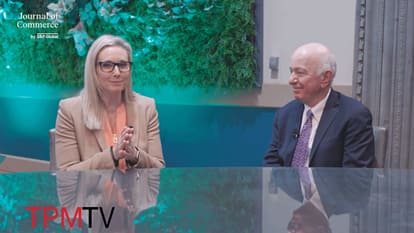- Program
- What's New
- Speakers
- Who's Attending
- TPM Community
- Partners
- Media

TPM TV
Episodes of exclusive TPM content featuring interviews of key stakeholders and attendees.
WATCH NOW - About

About TPM
The must-attend conference for the trans-Pacific and global container shipping and logistics community
LEARN ABOUT TPM - Get Updates
- FAQ's
Sessions With Eric Johnson
Sunday, 3 March
-
12:50pm - 01:30pm (PST) / 03/mar/2024 08:50 pm - 03/mar/2024 09:30 pm
TPM24 Orientation
With more than 60 sessions — many of them running concurrently — as well as numerous receptions and other networking opportunities, not to mention off-site activities, TPM can be an overwhelming experience. Successfully navigating the week requires a strategic game plan, but where do you start in your efforts to get the most out your time in Long Beach? In this brief introductory session for new and veteran TPM attendees alike, the TPM24 team will provide a roadmap of the four-day event, including details about what topics will be covered, how to obtain information you may be looking for, networking events, the physical TPM24 footprint, and generally how to maximize your TPM experience.- Speakers:
- Chris Brooks
- Tammy Auld
- Eric Johnson
Monday, 4 March
-
02:00pm - 02:15pm (PST) / 04/mar/2024 10:00 pm - 04/mar/2024 10:15 pm
-
02:15pm - 03:00pm (PST) / 04/mar/2024 10:15 pm - 04/mar/2024 11:00 pm
TPMTech: Keynote Session — What Integrations Really Matter to Shippers
System integration has gone from an IT, back-office concern to a strategic driver of growth in the world of global logistics. The rise of valuable point solutions and data providers today places the burden on organizations to cobble together systems in a way that’s not just user-friendly, but also better harnesses the potential of available tools. Much of this activity has been obscured from the view of shippers, with 3PLs, software vendors, and data providers partnering in the background on native integrations intended to improve service levels to shippers. But some shippers want more direct control over the processes governing international freight transportation, or they want oversight of those processes if handled by a 3PL or managed service provider. So, as integrations move from functional plumbing to strategic necessity, the question is which ones move the needle from a shipper perspective? This kickoff session at TPMTech will seek to specify for the technology and 3PL community which system integrations need to prioritize as “The Great Integration” takes center stage in a persistently fragmented logistics environment. -
03:05pm - 03:40pm (PST) / 04/mar/2024 11:05 pm - 04/mar/2024 11:40 pm
TPMTech: Using Demand Planning to Overcome Visibility Shortfalls
To many in the world of international logistics, visibility is a Band-Aid, not an elixir. Needing data about where a shipment is, especially if receipt of the data requires payment to a third party, is a sign of insufficient data quality from carriers and facilities across modes. But on a deeper level, it’s also a sign that an organization is so reliant on a specific shipment that it needs data about its whereabouts at key junctures because the price of not knowing is more costly. And that, at its core, is a failure of demand planning. Not having reliable enough forecasts of what’s needed, and where, puts a logistics department at an immediate disadvantage. That’s because logistics is then reacting to an in-the-moment need from another group in its organization. And the last-minute nature of that need means it needs to be followed more closely — i.e.,, with visibility — to ensure that shipment doesn’t go awry, potentially spoiling a seasonal promotion or a production line. In this session, logistics providers will describe how improving planning and forecasting upstream can alleviate some of the reliance on in-transit visibility.- Speakers:
- Jake Hoffman
- Jens Larsen
- Chelsea Morris
- Eric Johnson
-
04:10pm - 04:45pm (PST) / 05/mar/2024 12:10 am - 05/mar/2024 12:45 am
TPMTech: Has Technology Evolved Enough to Motivate Shippers to Start Making Their Own Ocean Bookings?
The act of booking space on a container ship is a seemingly mundane and low-value-added process for a shipper, hence why that has traditionally been handed off to logistics service provider partners. But the technology market has developed to such an extent that handling bookings isn’t, in theory, the cumbersome process it has been in the past. So, the question of whether shippers might want to handle that specific process internally is an interesting development on its own, but also a window into whether they might want to handle even more processes internally in the future. If software makes ocean freight booking relatively easy to handle, and shippers want control of that process, what does that mean for the future of what forwarders do for shippers? And how will that impact what technology shippers and forwarders buy in the years ahead. This session will explore ocean bookings as a prism for a landscape that is potentially shifting.- Speakers:
- Zvi Schreiber
- Kai Timmermann
- Panadda White
- Eric Johnson
-
04:50pm - 05:20pm (PST) / 05/mar/2024 12:50 am - 05/mar/2024 01:20 am
TPMTech: How Will the Correction in Startup Valuations Impact Industry Operations in 2024 and Beyond?
Valuations of VC-backed software vendors, data providers, and digital intermediaries peaked during the pandemic, but have fallen markedly since mid-2022. While this trend is far from universal, on the whole companies that raised sizable funding rounds at nine- and 10-digit valuations are struggling under the weight of those valuations. It’s not that these companies aren’t providing a useful product or service, or that they don’t significant revenue. It’s that the exits needed to justify the amount of cash invested are hard to square with the current demand environment. But outside of some spicy LinkedIn conversations, all of that largely doesn’t impact users of those products. Or does it? This session will delve into whether valuations of fast-growing companies — most backed by venture capital — actually matter to the current and potential users of those products, i.e., logistics practitioners.
Tuesday, 5 March
-
08:30am - 08:45am (PST) / 05/mar/2024 04:30 pm - 05/mar/2024 04:45 pm
Welcome Remarks and LOG-NET E-Commerce Excellence Award
LOG-NET's Electronic Commerce Excellence award has consistently reinforced the partnership between carriers and their customers and the fundamental importance of data quality in that relationship. Digitization has made data management and data quality foundational elements of successful global supply chains. Whether the data is coming from smartphones, web forms, Internet of Things devices, AI, or EDI, it needs to be complete, timely, and accurate. Data quality is critical, considering the consumers of this information now range from import and logistics specialists to business intelligence and machine learning platforms that demand ever more granular information. Since 2003, LOG-NET CEO John Motley has presented the LOG-NET E-Commerce Excellence award at TPM. The award recognizes the efforts of the international carrier community and its outstanding daily performance with LOG-NET's Trading Partner and Data Quality teams.- Speakers:
- Eric Johnson
- John Motley
-
11:10am - 11:40am (PST) / 05/mar/2024 07:10 pm - 05/mar/2024 07:40 pm
TPMTech Fireside Chat: A Conversation with Hapag-Lloyd's Karsten Ramm
Being a liner carrier inherently means investments in large and expensive physical assets — ships, terminals, offices, and the like — that, in many ways, define the business. But container lines also need to invest in systems, both internal systems that enable their employees and external ones that empower or connect their customers. Striking that balance has traditionally been difficult, and, truth be told, carriers rarely have been viewed by the market as digital innovators. But there is a now an expectation that container lines will adapt, become more digitally proficient and, in the end, serve their shipper and forwarder customers better over time through innovation. This fireside chat with Karsten Ramm, Hapag-Lloyd’s director of digital products and innovation, will explore how the German carrier views its responsibility to serve customers digitally, how it weighs internal and external investment in technology, and how innovation can be a differentiator in the market.
- Speakers:
- Eric Johnson
- Karsten Ramm
-
11:45am - 12:15pm (PST) / 05/mar/2024 07:45 pm - 05/mar/2024 08:15 pm
TPMTech: The Evolution of Infor Nexus
Two decades ago, Infor Nexus (then called GT Nexus) was an outsider in the logistics technology world, aiming to paint a new cloud-based version of how supply chains could run. But for a few years, the company has grappled with transitioning from the upstart to the incumbent. Product maturity brings stability, but companies that have lasted can also be perceived as being static, especially as venture capital has fueled a thousand new brands targeting parts of what Infor Nexus provides its customers. Over the past decade, GT Nexus (at the time) has merged with its kindred spirit, Tradecard, been acquired by ERP provider Infor, and was rumored to be for sale during the pandemic. In this one-on-one discussion, Heidi Benko, vice president of product management and solutions strategy, will discuss the lure of single end-to-end software suites, the company’s staying power, the challenge of competing with newer entrants, and where Infor Nexus goes from here.- Speakers:
- Heidi Benko
- Eric Johnson
-
03:20pm - 03:50pm (PST) / 05/mar/2024 11:20 pm - 05/mar/2024 11:50 pm
TPMTech: Democratizing Access to Software for Forwarders: A Conversation with GoFreight CEO Trenton Chen
The vast majority of forwarders globally rely on a homegrown operating system or one provided by the handful of incumbents that tend to dominate the market — or they have no operating system at all. There’s a reason for that development: Small to mid-sized forwarders have trouble carving out enough margin to invest in a proprietary system or established providers in the market. Those name-brand providers, meanwhile, tend to focus on the top end of the forwarder market, rationalizing that the time it takes to close a deal with a multibillion-dollar forwarder isn’t much longer than one with a mid-size forwarder with nine figures of revenue. But, in raw numbers, the SMEs in forwarding vastly outnumber the large players, and need technology to keep pace with the diverse landscape of 3PLs trying to win shipper customers. In this one-on-one chat, Trenton Chen, CEO of upstart forwarding software vendor GoFreight, will talk about democratizing software for the forwarding masses, competing in the market with established and difficult-to-dislodge vendors, and what specific problems technology providers can solve for forwarders.- Speakers:
- Trenton Chen
- Eric Johnson
-
04:25pm - 04:55pm (PST) / 06/mar/2024 12:25 am - 06/mar/2024 12:55 am
TPMTech: Taking Stock of the Supply Chain Investment Priorities
For the second year running, the 451 Research unit of S&P Global has surveyed logistics professionals to get a view into how shippers and 3PLs are prioritizing investment into a range of technologies. As shippers and 3PLs grapple with how to budget for investment in core products such as TMS, visibility, and purchase order management alongside newer imperatives such as automation and artificial intelligence, getting a picture of where the market in aggregate stands is increasingly important. In this one-on-one session, Mark Fontecchio, research analyst at 451, will discuss the findings of the benchmark survey and what they say about a market in flux due to tempered freight demand and a reduction in urgency post-pandemic.- Speakers:
- Mark Fontecchio
- Eric Johnson
-
05:00pm - 05:30pm (PST) / 06/mar/2024 01:00 am - 06/mar/2024 01:30 am
TPMTech: Using Outside Vendors as a Springboard to Internal Software Development
Freight Right, a mid-sized Los Angeles-based forwarder and supply chain management provider, competes in the very essence of a multidimensional market. On one side are established global 3PLs and on another are asset providers like Maersk and CMA CGM aiming to be full-service logistics integrators. On a third side are e-commerce platforms, most notably Amazon, with their eyes fixed on offering their flavor of integrated logistics. And on the fourth side are the tens of thousands of other small to mid-size forwarders in various regions. To combat the competitors coming from all angles, Freight Right has focused on what it needs from a technology perspective. Part of that has been an open attitude to testing third-party software and marketplaces. That, in turn, “sparked and sustained our own curiosity” around technology development, CEO Robert Khachatryan told the Journal of Commerce. That tech-centric attitude has driven growth “very much attributable to the constant search for new tech.” Khachatryan will discuss what drove the company to embrace tech, what has and hasn’t served Freight Right well, and how the forwarder competes in a fragmented space.- Speakers:
- Robert Khachatryan
- Eric Johnson
Wednesday, 6 March
-
09:05am - 09:50am (PST) / 06/mar/2024 05:05 pm - 06/mar/2024 05:50 pm
Case Study: From Automating Manual Processes to ERP Integration — How Technology Helped Make Two Shippers More Efficient
Founded in 2012, Toronto-based 3rdwave provides SaaS solutions that support the importing, exporting, trade compliance, and logistics functions for shippers. For Standard Textile, the mission was complex: Converting a largely manual trade management and compliance process managed via a home-grown “database” composed of physical folders to a centralized database on the 3rdwave platform. The result was fewer misplaced files, better organizational structure, and clearer visibility into the company’s import processes. Wine importer and wholesaler Plume Ridge faced an entirely different conundrum: as the company grew, it implemented an ERP system to support its operations, especially regarding customs entries. But even with the ERP, visibility into the supply chain was lacking, and the regulatory burden was costly. Because 3rdwave is built to work alongside ERPs and support import operations and trade compliance, it was able to deliver automated functionality including self-filing of Import Security Filings, customs entries, and Partner Government Agency (PGA) filings regulating commodity imports. This Case Study will explore the Standard Textile and Plum Ridge challenges, how 3rdwave addressed them, and the benefits the two companies have experienced since. -
12:00pm - 12:45pm (PST) / 06/mar/2024 08:00 pm - 06/mar/2024 08:45 pm
Case Study: Going With the Grain — How Alpi is Using Technology to Connect a Complicated Supply Chain
Alpi, an Italy-based manufacturer of wood products, faces an array of logistics challenges typical for any international shipper, including managing ocean bookings, visibility into shipments, and coordinating teams across multiple continents. Although these challenges are common to many logistics teams, the geographic footprint of Alpi’s supply chain adds a layer of complexity to the equation. The company largely sources in western Africa, and uses ocean freight to move materials and products from there to Asia and Europe. In recent years, Alpi turned to Buyco, a Marseille, France-based technology provider catering to shippers, to help it centralize and control those key ocean freight functions, a move Alpi logistics director Gianluca Bissaro said has given the company “an overview of all our container logistics operations.” In this shipper case study, Bissaro will give a view into how Alpi identified its technology needs, how it selected a vendor and how Buyco has helped it coordinate teams and reduce operational costs.- Speakers:
- Gianluca Bissaro
- Carl Lauron
- Eric Johnson

